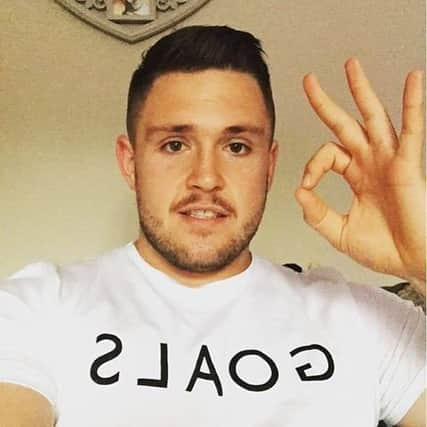Mental health campaigner Luke Ambler sends support to England star Aaron Lennon


The 30-year-old Everton midfielder - who has won 21 England caps - was taken to hospital on Sunday to be assessed after officers were called to Eccles Old Road in Salford.
Everton made a statement on Tuesday in which they said Lennon was “currently receiving care and treatment for a stress-related illness.”
Advertisement
Hide AdAdvertisement
Hide AdGreater Manchester Police said: “Police were called at around 4.35pm to reports of a concern for the welfare of a man on Eccles Old Road. “Officers attended and a 30-year-old man was detained under Section 136 of the Mental Health Act and was taken to hospital for assessment.”
Luke has worked tirelessly over the past year to encourage men to talk about their mental health. He started Andy’s Man Club after his brother-in-law Andrew took his own life and the related #ItsOKToTalk campaign gained national and international attention.
Since then, more clubs have opened across the country and Luke has had the opportunity to talk about his campaign with Prince Harry and the Prince of Wales.
He has also worked with national charity Samaritans.
Luke said: “I have said from day one, right back in the day starting my own work in emotional wellbeing around four years ago; everyone’s problem may be different but the emotions and outcomes are often the same.
Advertisement
Hide AdAdvertisement
Hide Ad“Aaron Lennon is a pro footballer. This doesn’t make him immune to having mental health problems or emotional wellbeing issues. If anything the pressure he is under it can magnify it.
“I can relate, albeit on a tiny level, of the pressures and stress of playing pro sport.
“So my message this morning, whether you’re a man, woman or a young person... don’t bottle your problems up, speak up and reach out and get the support you need.
“You are not alone, there is people from all and every walk of life going through hardships.”
Advertisement
Hide AdAdvertisement
Hide AdMeanwhile, a campaign to tackle loneliness which was devised by the late MP Jo Cox before her tragic death will this month shine a light on men.
The Jo Cox Commission on Loneliness today begins a month-long project to raise awareness of male loneliness and encourage more activities in communities to tackle the problem.
New research by Royal Voluntary Service - published to coincide with the launch - has revealed loneliness is widespread among men of all ages, with 35 per cent admitting they feel lonely at least once a week.
The Commission is calling on people to ‘Start a Conversation’ about male loneliness and help break the stigma.
Advertisement
Hide AdAdvertisement
Hide AdThe research also identified potential causes of loneliness among men, with 18 per cent citing moving away from friends and family as a key cause of loneliness.
It was an equal share of men - 17 per cent - who said being unemployed, the death of a family member and a relationship break-up were their main reasons for feeling lonely.
The survey found 25 is the age that men thought they had the largest group of friends and at 38 they had the least. A
nd 35 was the average age for feeling most lonely.
The cross-party Jo Cox Commission on Loneliness, which launched in January, is supported by 13 organisations and aims to act as a call to action.
Advertisement
Hide AdAdvertisement
Hide AdUnder the slogan ‘Start a Conversation’, the commission wants to encourage the public to help themselves and others by educating people on how to reduce social isolation.
Mrs Cox was in the process of creating the commission when she was killed outside her constituency last June.
Co-chair of the Commission, sitting Leeds West MP and parliamentary candidate Rachel Reeves, said: “Loneliness is a silent epidemic hidden inside every family and community in the UK and can affect any one of us and at any time. For the next month, we will explore how and why men experience loneliness and most importantly shine a light on the practical steps that can be taken to combat it. Now is the time to break the silence – and Start a Conversation.”